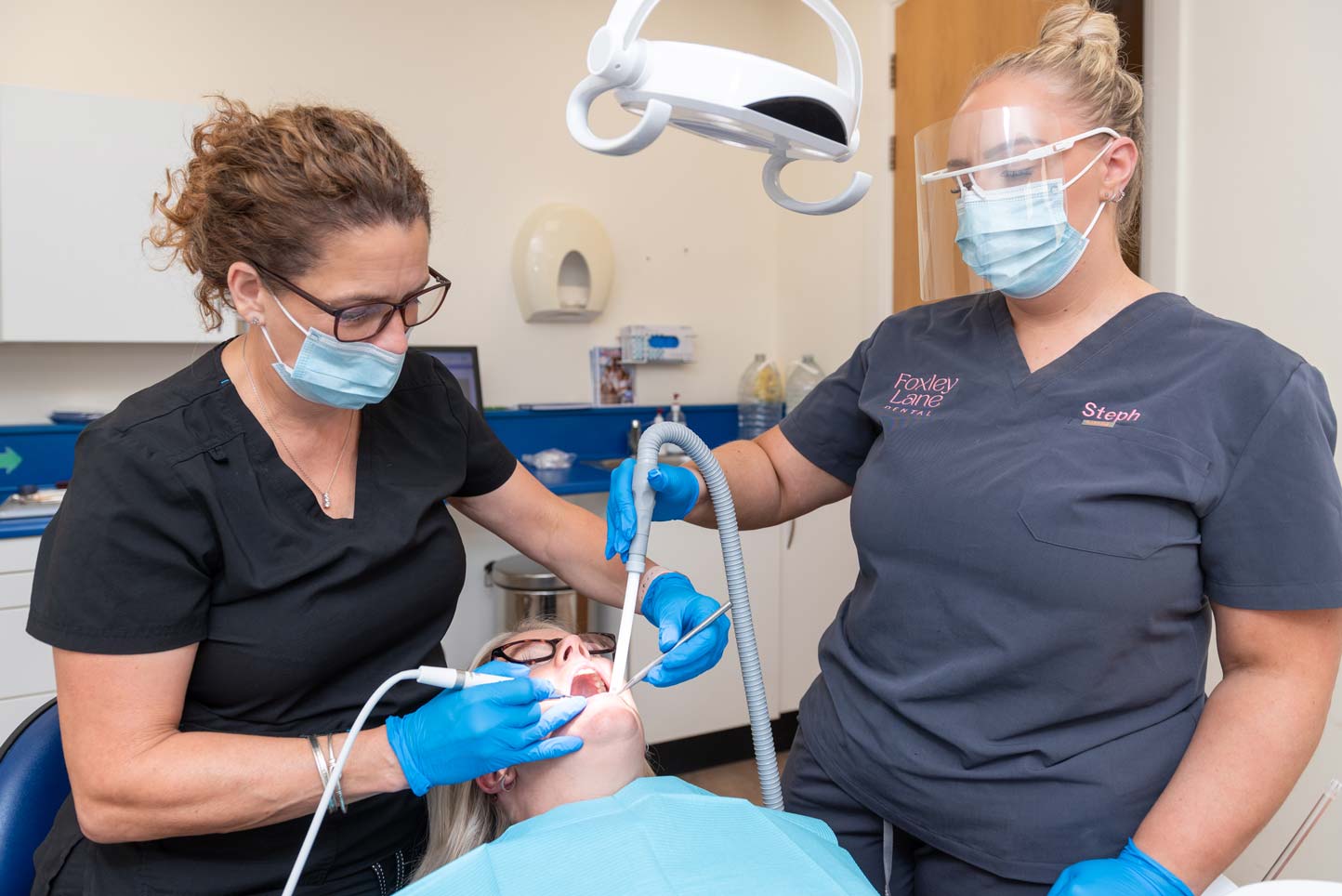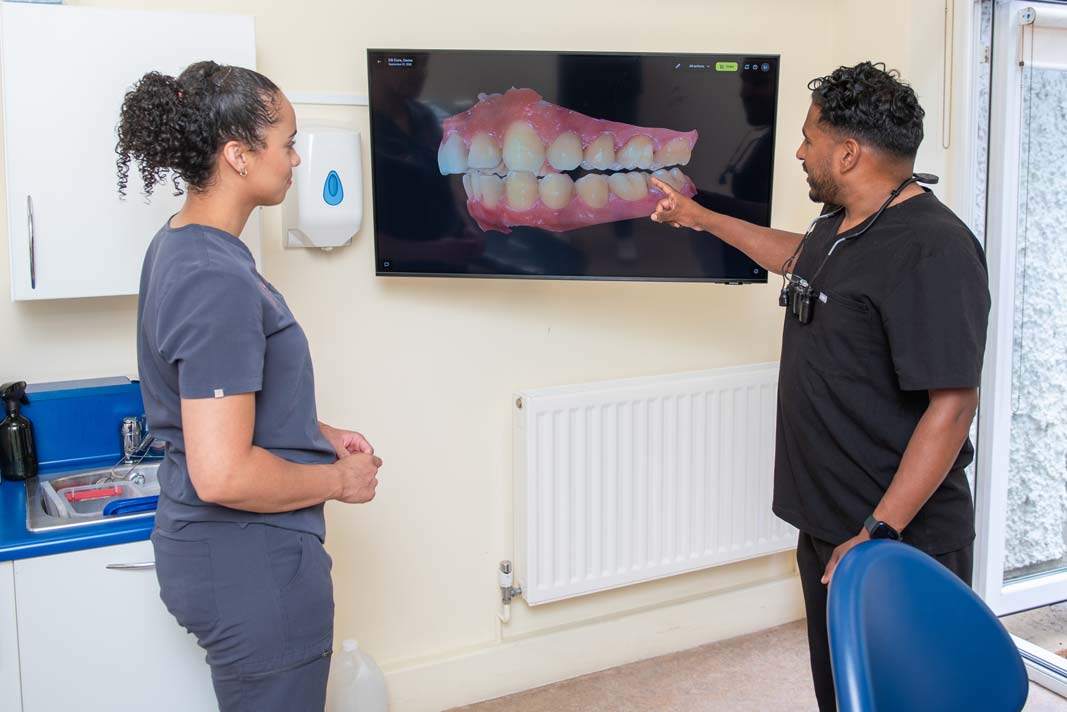We use cookies to ensure that we give you the best experience on our website. If you continue without changing your settings, we'll assume that you are happy to receive all cookies on our website.
Find out moreDental implants offer a durable, long-lasting solution for missing teeth - with a truly natural look and feel. In this guide, find out what dental implants are and why they’re the go-to choice for tooth replacement, and discover how to find the right dental implant provider in Purley, Croydon and beyond, to truly transform your smile.

Dental implants provide a safe, effective, and long-lasting solution for individuals with missing teeth. Whether you're dealing with damaged teeth, gaps, or loose teeth, implants offer a sturdy foundation for artificial teeth that look, feel, and function like the real thing.
At their core, dental implants consist of a metal post - typically biocompatible titanium - that replaces the root of a lost tooth. During dental implant placement, this metal post is embedded in the jawbone, creating a secure fit that closely mimics natural tooth roots. Once the implant post is in place, an abutment is attached to connect the post to a custom-made crown. Thanks to the process of osseointegration, where the jawbone tissue bonds with the implant over time, the result is exceptional stability, longevity and durability.
This multi-step treatment involves a team of experienced dental professionals, ensuring a comprehensive and specialised approach tailored to your smile restoration.
Dental implants offer numerous benefits over other tooth replacement options. Unlike conventional dentures that can slip and move, dental implants provide a stable and secure fit. They are designed to replace missing teeth without affecting the neighbouring natural teeth, a significant advantage over traditional bridges.
Dental implants cater to a variety of needs, from single tooth replacements to replacing a full set of teeth. This versatility makes them suitable for almost any situation where tooth loss or damage has occurred. They also provide a more permanent solution than bridges and removable dentures, which frequently require replacement or adjustment - simply care for them like your normal teeth once they’re in place!

The benefits of dental implants extend far beyond mere aesthetics. They provide a host of advantages that contribute to overall oral health and quality of life. These advantages are broadly categorised into natural appearance and feel, durability and longevity, and improved oral health.
Each aspect underscores why most dental implants are a leading choice for tooth replacement.
One of the most remarkable benefits of dental implants is how closely they resemble natural teeth. Patients often find it difficult to distinguish between their dental implants and natural teeth due to their realistic appearance and function. This close resemblance is due to their design, which closely mimics natural teeth, making them nearly indistinguishable from real ones. The titanium screw used in single dental implants acts as a sturdy root for the replacement crown, ensuring a secure and natural fit.
The aesthetic outcomes of dental implants are incredible. Patients report a boost in confidence and an improvement in their overall cosmetic appearance. Dental implants function like natural teeth, enabling patients to eat, speak, and smile without restrictions.
They provide a highly durable solution that closely resembles natural teeth. Unlike traditional bridges and dentures, dental implants are designed to last as long as natural teeth and may not require replacements. They provide a permanent solution for missing teeth, surpassing traditional methods in both functionality and aesthetics. Factors like care and regular maintenance influence their long-term success, making them a reliable and lasting investment.
Implants play a critical role in preventing bone loss that often occurs after tooth extraction. By mimicking natural tooth roots, dental implants help maintain jawbone integrity and prevent facial structure deterioration—supporting healthy tissues and gums, and contributing to better oral health.
There are various types of dental implants to cater to different dental needs. Each type offers unique advantages and suits specific situations. Knowing the different types can help in making an informed decision about which option is best for you. Two main types of dental implants include single implants, and full mouth implants (All-on-4).
A single dental implant serves the purpose of replacing a missing tooth, and is designed specifically for that function. It works and feels like a real tooth, offering a natural and seamless look. The biocompatible titanium screw placed in the jawbone connects the implant to the final restoration, which is the new artificial tooth or 'crown', ensuring a secure fit.
During the dental implant procedure, if the implant is near the front of the mouth, your dentist may provide a temporary tooth to wear until the healing process is complete. This allows you to maintain appearance and function while awaiting the final restoration.
The innovative All-on-4 dental implant system offered by cosmetic dental specialists such as Foxley Lane Dental, provides a life-changing solution for those missing most or all of their teeth. Using just four strategically placed dental implants, this approach restores a full arch of teeth, providing a secure, stable foundation without the need for multiple individual implants. All-on-4 is a popular choice for those seeking a more permanent, comfortable alternative to traditional removable dentures, bringing back both function and confidence with a natural-looking smile.

The dental implant procedure is a carefully coordinated process that involves the expertise of skilled professionals, including dentists, oral surgeons, periodontists, and prosthodontists. This team-based approach ensures your implants are placed correctly, function just like natural teeth, and leave you delighted with the result!
From your initial consultation and personalised treatment plan to the placement procedure and the healing phase (known as osseointegration), every step is designed with your comfort, safety, and long-term outcome success in mind.
During the initial consultation - which is offered free of charge at some providers, such as Foxley Lane Dental — treatment options, medical history, health conditions, and overall smile goals are discussed.
Following the assessment, a detailed treatment plan is created. This plan outlines the steps and costs involved in the implant procedure, ensuring that the patient is fully informed about what to expect.
Local anaesthetic is usually used during surgery to ensure comfort is at the forefront of every patient's experience. The implant is typically placed deep into the jawbone to function as a tooth root. If the implant is near the back of the mouth, a temporary tooth may not be necessary during healing.
There is usually no pain during placement, but some minor discomfort may be felt afterward, which can be managed with pain medication and proper post-operative support.
Osseointegration is crucial for successful dental implants. This process involves bone growing around the implant, eventually fusing with it to ensure stability and durability. Bone growth around the implants usually takes a few months, with osseointegration lasting from three to nine months.
During this healing phase, new bone growth is closely monitored by your dental professional to ensure optimal integration.
Once your implant has fully healed, your dentist will place an abutment - a small connector piece - onto the implant post. This abutment serves as the link between your implant and the final restoration. The last step is attaching the dental crown, which is custom-made to match the size, shape, and colour of your surrounding teeth. Designed to blend in beautifully, the crown completes your smile with a natural look and feel.

Proper care and maintenance are essential for the longevity of dental implants. Patients should avoid hard foods for a few days after the surgery, focusing on soft foods to allow the implant site to heal. A saltwater rinse can help reduce swelling and promote healing. Ice packs applied to the cheeks can also manage any swelling.
Pain medication may be prescribed to manage post-surgery discomfort and you'll be closely monitored for any adverse effects. Avoiding smoking is also advisable, as it can hinder healing and increase the risk of complications.
Long-term maintenance and routine care, including regular dental check-ups, are vital for the success and longevity of dental implants.
While dental implants have a high success rate, it's important to be aware of potential risks and complications. One possible concern is infection at the implant site. In some rare cases, surrounding structures - such as nearby teeth or blood vessels - could be accidentally affected during the procedure.
Nerve damage is another possibility, which may result in temporary or, rarely, persistent pain, numbness, or tingling in nearby areas. For implants placed in the upper jaw, sinus issues can occur if the implant extends into the sinus cavity. Additionally, if the implant does not properly integrate with the bone, it may need to be gently removed, allowing the area to heal before another attempt is made.
With expert care, thorough planning, and proper aftercare, these risks are uncommon - and your dental team will guide you every step of the way to help ensure the best possible outcome.

While not everyone qualifies for dental implants, many people are great candidates with the right planning and care. The process begins with assessments from experienced specialists. A thorough review of your medical history and a detailed dental examination help create a personalised treatment plan just for you.
If you're managing active gum disease, addressing this is an important step toward becoming a candidate, as healthy gums and teeth play a key role in implant success. In cases of insufficient jawbone density, a bone graft can provide the necessary support to move forward with treatment. With the right care and guidance, many patients are able to enjoy the lasting benefits of dental implants.
Several factors can influence the cost of dental implants, including your individual needs, private insurance coverage, and the experience of the dental team involved. The good news is that an initial consultation will give you a clear understanding of what to expect, with a tailored plan that outlines the costs specific to your treatments, so there are no surprises, just clarity and confidence.

When selecting an expert dental implant provider, ask if they offer the following:
All this - and more - is available at Foxley Lane Dental, where your comfort, care and confidence come first.
Dental implants offer a revolutionary solution for those struggling with tooth loss. They provide a natural appearance, long-term durability, and improved oral health, making them the gold standard option for replacing teeth.
In conclusion, dental implants are more than just a cosmetic solution; they are a significant investment in your overall health and wellbeing. By choosing dental implants, you are choosing a permanent solution that will enhance not just your smile, but your overall quality of life for years to come.

Get in touch with us for your free dental implant consultation in Purley today.
Dental implant surgery is typically performed under local anaesthetic, so you won’t feel pain during the procedure. Some mild discomfort may occur afterwards, but this is usually manageable with pain relief. Your dental team will ensure the surgical procedure is as smooth and comfortable as possible.
Yes. If you have one missing tooth, a single dental implant is an ideal option. It replaces both the visible tooth and its root without affecting the surrounding teeth, unlike some traditional false teeth or bridges.
In cases where severe bone loss has occurred, your dentist may recommend bone grafting before proceeding with the implant. This ensures there’s enough bone to support the implant body and allow for healthy bone growth during the healing phase.
Healing time varies, but most patients experience significant recovery of the gum tissue within a few weeks. Full bone healing through osseointegration can take 3 to 9 months, depending on your health and bone density.
Unlike conventional dentures, which may become loose or irritate gum tissue, dental implants are fixed in place and function like natural teeth. They help maintain surrounding bone, offer greater comfort, and avoid the slipping associated with dentures or false teeth.
With proper care, dental implants have a success rate of over 95%. Factors such as bone healing, gum health, and avoiding habits like smoking all play a role in the success and lifespan of your dental implant, and avoid the unlikely possibility of implant failure.

For composite bonding, dental implants, veneers, teeth straightening and teeth whitening:

For children's appointments, dental check-ups, dental hygiene and emergency appointments:



I couldn’t have asked for better treatment. Highly recommended. I am a very happy patient!
Bridget butcher


Excellent care and attention with very experienced dentists and efficient reception with all the latest modern equipment one would hope for. Highly recommend.
anthony carter-clout










Monday
8.30am - 5.00pm
Tuesday
8.30am - 5.00pm
Wednesday
8.30am - 8.00pm
Thursday
8.30am - 5.00pm
Friday
8:30am - 4.00pm
Saturday
9.00am - 2.00pm
Sunday
Closed



